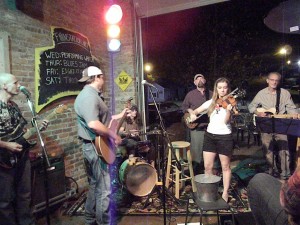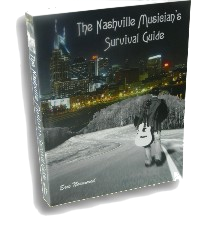Vocalist
Judy Rodman on “Singing in the Studio” at the Nashville Berklee Jam
Our guest speaker for the June, 2014 Nashville Berklee Jam was award-winning vocal coach, Judy Rodman. In this in-depth workshop she covers many facets of the most challenging endeavor a vocalist will encounter, singing in the studio. Here are some highlights from her talk (her entire presentation can be viewed below).
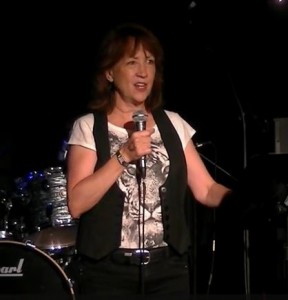 “The studio is an odd place to sing, it’s very artificial…it requires perfection, because the mic is really sensitive… and recording is forever.”
“The studio is an odd place to sing, it’s very artificial…it requires perfection, because the mic is really sensitive… and recording is forever.”
To optimize a studio performance, Judy offered many practical pieces of advice:
- Make sure that you get the cue mix that you want.
- Make sure you get the right amount of reverb.
- Try singing with one side of the headphones on and one side half off. This allows you to “be a little grounded in the room acoustically”.
- Take some things out of the mix that are swimmy or distracting.
- When singing lead, experiment with tracking the song in sections, for instance verses first, then a high chorus
- Regarding tuning and compression – “You want to sing as well as possibly can so you can use as little of that correction as possible…then the song is going to sound more natural and you’ll be in control.”
One reason that singing in the studio is hard is that you are missing an audience. Most singers that are new to singing in the studio tend to look down at the mic. “I can’t think of any song I’ve ever heard that the lyrics were directed to the mic, and when you sing to the mic that way, it’s going to sound like you’re not singing to anyone.” To remedy this, Judy’s suggests singers don’t face the control room. Face a corner or somewhere you’re not distracted and imagine you’re singing in a concert hall. “Create your own holideck.”
Another thing that makes studio singing hard is that most studio settings are not set up for optimal singing. “I’ll bet you 95% of the studio’s I ever go into, the mic is not set up, the music stand is not set up, the cue box is not set up in ways that would help a singer automatically have the best breath control.” During her talk, she demonstrates the proper way to place a mic stand, music stand and cue box to give the singer the space they need to optimize breath control. “Move the music stand and cue box back a little.” The singer shouldn’t have to lean forward to reach the mic.
Regarding multiple takes of a vocal, sometimes an engineer or producer might say, “okay, this pass, give me everything you’ve got!”. This doesn’t mean to push harder. Often, the louder you sing, the smaller you sound. The louder you sing, the more they have to pull you back because your pinging the meter. And you lose resonance. “More is two things – passion and resonance.” The magic formula is “back off the pressure, add passion”. The power comes from your butt, hence the phrase “sing your butt off!”
Lastly, “You want to know how to maximize your efforts so you get magic”. Know how to prepare for the studio, know your songs backwards and forwards, know your keys and tempos. The day of your vocal session – get a massage, drink water like a fish, watch what you wear (noisy fabrics, ball caps, sun glasses – don’t let anything come between you and the vocal).
Judy Rodman is an award winning vocal coach, session singer, recording artist, stage and television performer, songwriter and vocal producer. Named ‘Best Vocal Coach” by NashvilleMusicPros.com and “Vocal Coach in Residence, August 2013” by TC Helicon’s Voice Council Magazine, Judy teaches her trademarked vocal training method “Power, Path and Performance”™ to singers and speakers nationally and internationally in her office, by phone and Skype. She is a published author with several professional vocal courses; her “All Things Vocal” blog has over ½ million views. Her vocal clients include major and indie recording artists and labels, touring and studio background singers, national public speakers and voiceover talent. She has had #1 records as an artist, songwriter and producer, and won ACM “New Female Vocalist” and BMI Millionaire awards. She is member of NATS, AFTRA, SAG AFofM, BMI. Judy’s vocal students include: Kacey Musgraves, Mat Kearney, Pam Tillis, Dakota Bradley, Radney Foster and Brian White, to mention a few. To learn more about Judy or for more practical vocal tips please visit her website, JudyRodman.com.
The Berklee Nashville Jam is a bi-monthly event held on the last Monday of every other month at the Rutledge and hosted by Berklee alum, Eric Normand ‘89. The event, which is open to the public, is free for alumni and a guest; and $5 for non-alums. After the guest speaker, attendees are welcome to jam with the house band and others from the Nashville music community. For more information about the Berklee Nashville Jam, visit www.nashvilleberkleejam.com.
Judy’s Talk
https://www.youtube.com/watch?v=gicktGzuIY8
Nashville Performance Coach, Diane Kimbrough speaks at the Nashville Berklee Jam – October 28, 2013
Monday, October 28 was another great Nashville Berklee Jam, and our special guest on that night was Nashville’s most in-demand performance coach, Diane Kimbrough. Early on in her talk Diane addressed the essence of performance coaching.
“Why do we need live performance coaching, why isn’t it good enough to just play great music…? We don’t make money from music, music is free. 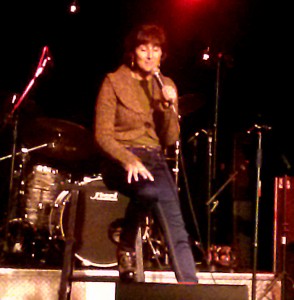 Artists make money from touring and from merchandise… You have got to give an audience a tremendous experience that is beyond what the music is, otherwise why are they going to pay $75 for a concert ticket when they can get the music for free…”
Artists make money from touring and from merchandise… You have got to give an audience a tremendous experience that is beyond what the music is, otherwise why are they going to pay $75 for a concert ticket when they can get the music for free…”
She continued, “…That’s why it’s so important for your success as an artist to really put a lot of effort into fine tuning your show and your relationship with three things on stage; your audience, your band, and your instrument”
She explained that you need to “create an experience” and that you need to “go deep into your music and find what speaks to your audience”.
The music that is dearest to my heart would be most American roots music recorded up to the mid-1970’s, music born of an era when the visual presence of an artist played a lesser role. Back then, the power of the music itself was more integral to an artist’s success. Well you know the old saying, “video killed the radio star”. As much as I would rather just get lost in my music during a live performance, I do realize that if I fail to acknowledge my audience and bring them into the show they are less likely to “get” my music. After all, it’s no longer 1969, and I’m not performing at the Fillmore.
Diane continued, “Everything you do on stage should be a reflection of what you’re doing musically and lyrically…How might somebody else think about your song?… They’re not into how cool you play it but how you make them a part of it.”
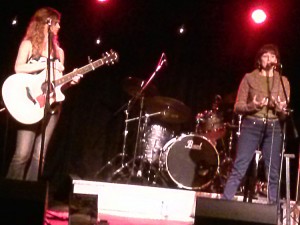 To demonstrate how this works, Diane critiqued several performances throughout the night. After each performance Diane would make some critiques and suggestions, and then the performer tried it again with the new ideas in mind. I must say that everybody showed immediate improvements. I even put myself on the chopping block, performing one of my originals. Diane stopped us half way through the first verse and asked
To demonstrate how this works, Diane critiqued several performances throughout the night. After each performance Diane would make some critiques and suggestions, and then the performer tried it again with the new ideas in mind. I must say that everybody showed immediate improvements. I even put myself on the chopping block, performing one of my originals. Diane stopped us half way through the first verse and asked
“Who are you playing for?”
“I’m playing for you guys”, I answered.
“You could’ve fooled me, because you came up and started looking right there at the floor, and there’s all of us out here that missed you on that wonderful intro.”
I explained that I was actually looking down at my left hand on the guitar, which happens to be in line with the floor, perhaps a habit that many of us guitar players have.
“You’re up there for us to have a good time… you have to engage us visually. That’s not just you, that’s for everybody”, Diane commented, motioning to the other players in my band. “Otherwise, you’re playing for yourselves, and you can do that in your bedroom. The song doesn’t start when the lyrics start, the song starts when you walk on stage.”
We tried the song again, but this time I made it a point to look ahead and into the crowd, making eye contact with several people while engaging in a few visual enhancements. I have to say that the performance was instantly more powerful, drawing a more notable response from the crowd. After the second chorus of the song Diane stopped us midway through my guitar solo.
“What I’m getting is ‘I’m playing this cool music’, what I want you to play is, ‘let me give you a gift of this cool music’. I want you to play, ‘hey guys, listen to this, this is for you’. You’re not playing it because it’s cool, you can do that in your bedroom. You’re playing it because you want them to have this. Give it away as a gift…do the physical things that say this is for you.”
She also addressed my other bandmates.
“Mike (our bassist), you’re [conveying] hey man what do you think of this? And he’s going (motioning to our drummer), ‘man, that’s cool’. And you’re also [conveying] to the audience, ‘what do you think of this, want some of this?’
We tried the performance one last time and, needless to say, the different mindset not only translated into a deeper connection with our audience and a bigger response, but also made for a better musical performance. Diane commented on our improvements and finished her part of the night with a few more remarks.
“What you always have to do is stay aware of the reason that you’re there, which is, the audience. You’re there so that they have an experience, they’re not there so you have an experience. They really don’t care if you’re having a good time, if you get to have a good time that’s the icing on the cake… you have to translate everything you’re doing to the fact that your there so that they have a good time. God knows in this industry we’re not here for the money… you’re here because you want to make them have an experience, that’s why you get to keep coming up here and doing it, because you made them have an experience. If you love what you do and you want to keep doing it you have to do it because of the audience…after all, they paid the cover; they already gave something to you.”
If you’d like to learn more about Diane or e-mail her some questions, please visit her website.
The Nashville Berklee Jam is held at The Rutledge on the last Monday of every other month, with the next event to take place on Monday, February 24, (guest speaker TBA).
For more info about future events, please visit the Nashville Berklee Jam website NashvilleBerkleeJam.com
If you would like to learn more about the Nashville music industry, please check out my website and book “The Nashville Musician’s Survival Guide”.
Nashville Berklee Jam with Dallas Davidson, February 18, 2013 – Part I
By Eric Normand
A cold, damp rainy night wasn’t enough to stop Berklee alumni and others from converging on one of Nashville’s coolest venues, The Rutledge in what would be the first Nashville Berklee Jam to be held in downtown Nashville. Monday, February 18 marked the one-year anniversary of this event which had previously been held in the suburb of Kingston Springs, and the move to downtown aims to kick the event’s profile up a notch as this centrally located venue is perhaps one of the finest performance rooms in the city.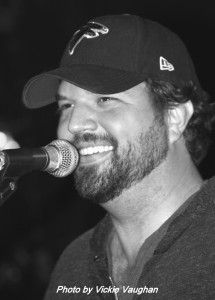
People began rolling in around 6:30, and the guest speaker on this night, 2012 NSAI, ACM, and BMI songwriter of the year, Dallas Davidson began his portion of the night shortly after 7:00 PM. Dallas, Rhett Akins, and Ben Haslip, make up the songwriting team known as “The Peach Pickers”, who in recent years have become the most successful songwriting team in the history of Nashville. Since moving to Music City from Albany, GA in 2004 Dallas has had over 100 of his compositions recorded including 13 number one hits – “Gimme That Girl”, “Just a Kiss”, “The One That Got Away”, and “I Don’t Want This Night to End”, to name a few.
I gave him a brief introduction, he spoke briefly about his journey to Nashville and how he got his start as an “in-the- trenches commercial songwriter”, and then he quickly got into some questions and answers.
In response to a question about naysayers along the way during the years leading up to his recent success, Dallas candidly responded:
“The list is long and distinguished… starting with my dad… [Laughs]… a lot of publishing companies passed on me, all of ‘em did… the first time around and the second time around.”
He went on to tell of how he got his first big break, a story which underscores the importance of a person’s character.
“A guy named Brett Jones actually signed me to a publishing deal. He started a company called Big Borassa, I was his first writer that he ever signed, and he swears that he didn’t even listen to my songs; he just got to know me and believed in me… I was very, very fortunate to have somebody like that guy come in there and give me a shot and write with me and teach me a lot of stuff.”
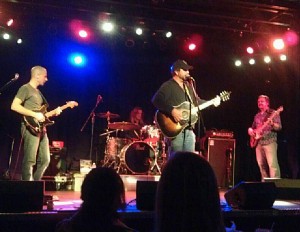 Dallas spoke about how he uses his small-town roots to provide topics to write about, as he wants to be “the mouthpiece” of his rural friends. He shared that he likes to write the melody first, then the groove before starting on the lyrics.
Dallas spoke about how he uses his small-town roots to provide topics to write about, as he wants to be “the mouthpiece” of his rural friends. He shared that he likes to write the melody first, then the groove before starting on the lyrics.
In response to “What advice would you give aspiring songwriters?” Dallas replied:
You’ve got to write a bunch of songs… I mean this in the friendliest, competitive way… your direct competition is me and Rhett Akins and were writing 100 to 150 songs a year… Work harder than us and believe in yourself, because that’s all we did… don’t take no for an answer…
Concluding his portion of the night was a mini set of four of his recent number one hits, which we were fortunate to capture on video (courtesy Jack Zander). The band behind him on this night consisted of the players who backed Dallas and Rhett Akins on the 2012 Luke Bryan Farm Tour – Tom Good on bass, Nick Forchione on Drums, and me on guitar. Dallas’s heartfelt performance was well received, and upon its conclusion I thanked him and took a few minutes to reorganize for the jam portion of this event (which will be explored in part two of this blog). Meanwhile, please enjoy the videos below from Dallas’s performance!
The Nashville Berklee Jam is held at The Rutledge on the last Monday of every other month, with the next event to take place on Monday, April 29 featuring special guest, Bassist, Bryan Beller (Joe Satriani, Steve Vai, Mike Keneally) who will also be joined by his wife, Kira Small.
For more info about future events, please visit the Nashville Berklee Jam website NashvilleBerkleeJam.com
If you would like to learn more about the Nashville music industry, please check out my website and book “The Nashville Musician’s Survival Guide”.
Rhett Akins: Hit Writer, Small Town Swagger
Our most recent Nashville Berklee Jam featured hit songwriter and country music artist, Rhett Akins as the guest speaker and performer. The Georgia native and member of the red hot songwriting team, “The Peach Pickers” is currently one of Nashville’s hottest songwriters, and his talk focused on just about every aspect of that world you could imagine. Working with Rhett as his tour manager, bandleader, and lead guitarist for the last seven years has given me some great perspective on what goes on in the world of a Nashville songwriter. And on this comfortable late summer night he gave the crowd of alums and locals at the Fillin’ Station a real peek behind the curtain into that otherwise secret society. Rhett preceded and followed his talk by performing some of his most recent mega-hits with two members of the alumni house band (Heston Alley on drums and me on guitar) and two other members of his touring band – session aces and former “G-men”, Mike Chapman on bass and Chris Leuzinger on guitar. Rhett also invited fiddle player/singer and Berklee alum, Michel Lambert to the stage to perform some classic country and bluegrass. Today’s guest blog post about this event was written by performing writer and fellow Berklee alum, Shantell Ogden ’05. Here’s her recap of this great talk:
Rhett Akins: Hit Writer, Small Town Swagger – by Shantell Ogden
After twenty years in the music industry in Nashville, there isn’t much that Rhett Akins hasn’t seen. He stopped by our recent Berklee College of Music alumni event (hosted by Eric Normand) to share some of his experience as an artist and songwriter.
The early days…
Rhett described music itself as his biggest motivator as a kid. He said he “always had his head between speakers” and joked that he listened to the 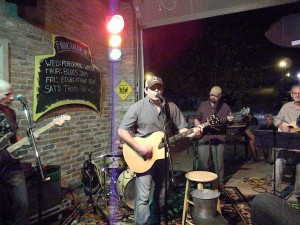 Kiss Alive II album so much that he probably knows “every sound on that record.”
Kiss Alive II album so much that he probably knows “every sound on that record.”
“Not having access to music at all times made me love it more,” he said. “We didn’t have iPods back then so you had to make the effort to buy and listen to it.”
Rhett said his early songs were very personal. “I would write songs in deer blinds about girls back in high school. Back then, I was just writing what I knew and what was true to me.”
Rhett first came to Nashville with his grandpa who knew an entertainment lawyer through a family connection. Through this connection, Rhett met John Jarrard, a hit songwriter in town. John was blind and counted the steps from his home to his Music Row office to write each day.
“I guess he liked me and thought I had potential,” said Rhett. “We started writing songs together and I learned a lot from him.”
Not long after, Paul Worley signed both Rhett and Terri Clark to Sony/ATV publishing as writers and artists. Rhett was with Sony from 1993 to 1996. [Note: He didn’t have a publishing deal for 10 years (because he was writing songs for himself as an artist). He signed a co-publishing deal with EMI in 2006, and since EMI was purchased he now writes for Sony again.]
Rhett admits that in his early career, the biggest mistakes he made were in trusting people on a handshake, like he had in his hometown in Georgia.
“I’m really glad that my granddad and our lawyers were smart enough not to lock us into lifetime contracts,” said Rhett. “Those contracts cost a lot of bands a lot of money to get out of.”
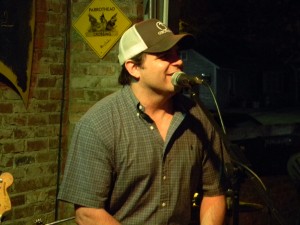 He said that sometimes speaking his mind has also been a mistake, but that’s not something he regrets much. Even though some choices weren’t the best for his career, they were the best for the music he was creating.
He said that sometimes speaking his mind has also been a mistake, but that’s not something he regrets much. Even though some choices weren’t the best for his career, they were the best for the music he was creating.
Pinch me moments…
When asked about some of his career ‘pinch me moments’ Rhett said there were a lot of them. Here are a few he mentioned:
• When he was 22, Rhett was sitting in Donna Hill’s office when the phone rang and she said, “Hang on a minute, it’s Conway.” Rhett was a huge Conway Twitty fan, and could hear his idol’s voice on the phone.
• He was at the AMA awards one year sitting between LL Cool J and The Smashing Pumpkins.
• Hank Williams Jr. recorded one of his songs, “Thirsty,” on an album he did in 2010.
• He toured with Reba and was on the David Letterman show.
Nowadays…
Rhett said he’s evolved as a writer in how he writes and where the ideas come from.
“When you write over a 100 songs a year, you start pulling ideas from anywhere and everywhere,” he said. “I still want to write what’s true, it just might be someone else’s story.”
And sometimes he even has a specific artist in mind when he’s working on a song.
“When we were writing ‘Honeybee’ the chorus came first,” he said. “We knew that the verses had to be a little crazy because a girl would just laugh if a guy actually said, ‘you be my little Loretta, I’ll be your Conway’ and the other lines in the chorus. Ben [Hayslip] and I were thinking about Blake Shelton for it because he has the sense of humor to pull off a song like that.”
“Honeybee” became a number one Billboard hit for Blake, making it just one of the songs that Rhett and the other Peach Pickers (Dallas Davidson and Ben Hayslip) have written in recent years.
So, what is a writing session like with the Peach Pickers?
“We are really laid back about it,” said Rhett. “We usually get together around 11:00 every Wednesday and talk about hunting and sports for a bit. We eat lunch and then usually someone has an idea to work on. If we don’t finish it that week, we get to it again the next week.”
Dallas and Rhett are usually thinking about the music, while Ben is more focused on lyrics. The three have written so much together they’ve built up a lot of trust.
“We tell each other when we don’t like something, and sometimes we think the songs should go in different directions,” said Rhett.
Despite all of his success, Rhett is quick to point out that the music industry and which songs get cut is still a mystery to him.
“I don’t understand why some songs suck and somehow they become a hit, while other songs you think are hits never make it,” he said. “I just show up everyday because you never know when the magic is going to happen.”
Rhett likes being a songwriter because writers don’t have the pressure of radio that artists do and “you can write 10 bad songs and not worry about it, but an artist can’t record too many bad songs in a row if they want a career.”
Rhett isn’t afraid to cross genres as a writer. He recently collaborated on some rap music with T-Pain and said that in his view the new era of country is really headed musically in a more rock/pop/hip-hop direction.
Accomplishments aside, you can’t help but want to shoot the breeze with Rhett. He’s got a laid-back small town swagger, and he isn’t afraid to be who is his.
For more information on Rhett, visit his website. For more information on monthly Berklee alumni events in Nashville, visit Nashville Berklee Jam (events are free and open to the public). To view the original blog post and other music industry articles by Shantell, please visit her website at www.shantellogden.com. If you’re interested in reading a in-depth interview with Rhett about songwriting, check out “The Nashville Musician’s Survival Guide” by Eric Normand
The Nashville Berklee Jam Goes Public
Today I want to tell you all about an exciting monthly event I have been hosting – The Nashville Berklee Jam, and its new accessibility to everyone in the Nashville music community. The beginnings of this idea came to me a few years ago when I first attended the annual Nashville Berklee Alumni Reception. On my way home that night, I remember thinking how great it was to meet so many musicians in one night who were so passionate about their musical ambitions and so hungry for knowledge. These musical comrades were a mix of Berklee alumni residing in middle Tennessee and Berklee students who came down for the annual Nashville field trip. At this reception I made connections with other like-minded alums and students who came down on the field trip, the latter peppering me with questions about my experiences in Music City. This event was a very stimulating night as the energy of three hundred musical minds meeting and conversing seemed to create an air of camaraderie and untapped potential! Then I went home and another year passed before I got this fix again.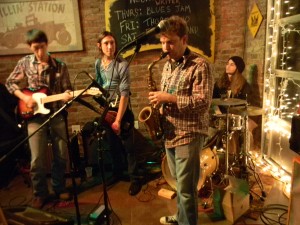
So this past winter I decided to create a monthly event to try to emulate this musical networking hoedown on a smaller scale, and The Nashville Berklee Jam was born. Held on the first or second Tuesday of the month from 7 PM to 11 PM at The Fillin’ Station in Kingston Springs, TN, these events start out with an informal meet and greet, followed by a Nashville music industry guest speaker, and end with an open jam. So far the reception has been very positive, here’s a recap (with links to their corresponding blogs):
February – A-list session bassist, Mike Chapman gave a great talk about being a session musician, outlining key concepts in what he calls, “the essential slices of the session player pizza”. He also jammed with several alums after the talk.
March – award-winning vocal coach, producer, and hit songwriter, Judy Rodman gave an insightful talk about career paths for vocalists. She also performed a couple of songs with the house band and then critiqued and coached several vocal performances, helping vocalists make instant improvements.
April – Stevie Ray Vaughan keyboardist, Reese Wynans shared his fascinating story about being a lifelong-career musician, the life-changing moment that came on his last night with Delbert McClinton that landed him the SRV gig, and the whirlwind years that followed. After his talk, he joined us for a few inspired performances.
May – fellow alum, musician, and author of “The Nashville Number System”, Chas Williams gave an introductory class on this subject. After the class, he charted one of alum, Sarah Tollerson’s originals and performed it with Sarah and the house band with everybody reading the chart off a dry erase board.
June – drummer, producer, and clinician, Rich Redmond gave an inspiring talk on “Navigating the Nashville Music Industry” speaking candidly about his early “lean years” in Music City and different approaches to finding success here. After his talk he sat in for a few tunes and stuck around to chat with others in attendance.
For our next event, to be held on Tuesday, July 10, I will be giving a talk that continues last month’s theme – “Navigating the Nashville Music Industry – Part Two”, during which I will explore some of the concepts I write about in my book “The Nashville Musician’s Survival Guide”. And, this just in, for our event in August we are proud to announce that the guest speaker/performer will be none other than Nashville guitar ace, Jack Pearson, formerly of the Allman Brothers, Vince Gill and many others.
All of the guest speakers have given great talks, sharing their knowledge and providing inspiration, and these talks have been interactive with many great questions and comments from alums. My band, Skinny Buddha (comprised of Berklee alumni and others from the Nashville music community) provides backline and a starting point for the laid back jams which have covered everything from originals to classic rock to blues tunes to two-chord jams. All of these events have been great friendship building and networking experiences for all involved, as well as educational. So far, the attendance has been mostly comprised of Berklee alumni, but as there seems to be a growing interest from others in Nashville, we are now officially making this event open to the Public. Nashville is a diverse and complex music community in which a Berklee alumni community also resides, and it is my goal to help these two worlds intersect and meld together.
So come on out to our next “Nashville Berklee Jam” On Tuesday, July 10. I hope to see you there!
P.S. if you have any comments, thoughts, or questions, please feel free to e-mail me at eric@ericnormand.com
Nashville Berklee Jam with Judy Rodman – March 6, 2012
Our second “Nashville Berklee Jam” at The Fillin’ Station in Kingston Springs this past Tuesday was a great success! The guest speaker on this night was none other than Nashville’s award-winning vocal coach, Judy Rodman. Judy has played many a role in the Nashville music industry 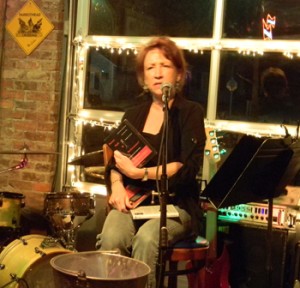 over the years – recording artist, A-list session singer, producer, hit songwriter – and on this night her talk focused on different career paths for vocalists. Judy was involved in the writing of my book “The Nashville Musician’s Survival Guide” and, backing up my theory of the necessity to “wear a lot of hats”, she talked about multiple streams of income for today’s musicians and artists. Among the potential jobs for vocalists she outlined were artists, live singers, and session singers (jingle singers, background vocals, demo singing, and voiceovers).
over the years – recording artist, A-list session singer, producer, hit songwriter – and on this night her talk focused on different career paths for vocalists. Judy was involved in the writing of my book “The Nashville Musician’s Survival Guide” and, backing up my theory of the necessity to “wear a lot of hats”, she talked about multiple streams of income for today’s musicians and artists. Among the potential jobs for vocalists she outlined were artists, live singers, and session singers (jingle singers, background vocals, demo singing, and voiceovers).
Here are a few excerpts:
“Recording artists need vocal ability, because the mark is up. Even with pitch fixing, rhythm fixing…your vocal needs to be as good as it possibly can be because it’s going to sound more natural and it’s going to be more emotionally compelling…You also need a ‘unique artist definition’…it’s not good enough to be just another great singer…you really need to be unique and find your own definition as an artist – your uniqueness, your vocal uniqueness – which means you need to explore your whole voice and your life experiences that you’re going to put into your art. The sound of your artistic definition is going to have to do with the sound of your voice, the choice of your instrumentation, and your message… Artistic definition takes exploration. For those of you wanting a career as a recording artist I would say don’t shortcut your experimentation.”
“For live background singing – you need to have the ability to trace and completely blend and go with the nuances of the voice of the singer you are looking to back…You’ve got to be able to change your sound as the artist wishes…you will of course have to have the ability to sing harmony parts and hear them… you have to have a specific look – whatever the artist is looking for. You need to network and find out who is gigging, who is in need of background vocalists.”
“Session singing…You need great vocal technique, usually you’ll need some vocal training…you really need to have surgical control of your voice for pitch, sound, blend and nuances –because time is money in the studio…You need to of course hear harmony parts quickly, you need to have the ability to read manuscript…but you also need to know the Nashville Number System.”
Judy then gave some practical vocal technique tips before answering several questions from alumni. Click on the following links if you would like to hear her talk in its entirety.
Audio clip: Adobe Flash Player (version 9 or above) is required to play this audio clip. Download the latest version here. You also need to have JavaScript enabled in your browser.
Judy Rodman Talk – Part 1 (21 min)
Audio clip: Adobe Flash Player (version 9 or above) is required to play this audio clip. Download the latest version here. You also need to have JavaScript enabled in your browser.
Judy Rodman Talk – Part 2 (21 min)
There is also a ton of useful and practical information for vocalists at Judy’s website www.judyrodman.com.
When her talk concluded we began the jam portion of the evening with our house band backing Judy for two songs to start things out. Her second tune, “One Way Ticket”, was a number one hit she wrote that was cut by LeAnn Rimes. Judy’s vocal performance was emotionally 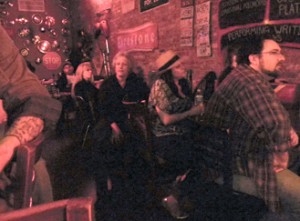 charged and inspiring to say the least, and this set the tone for the rest of the evening. A special dynamic on this night was the “optional vocal performance critique” that Judy offered for willing participants. To break the ice, I decided to go first and sang my two songs with the house band. After my first song, Judy pointed out some of the strengths about my performance and addressed a few things to work on.
charged and inspiring to say the least, and this set the tone for the rest of the evening. A special dynamic on this night was the “optional vocal performance critique” that Judy offered for willing participants. To break the ice, I decided to go first and sang my two songs with the house band. After my first song, Judy pointed out some of the strengths about my performance and addressed a few things to work on.
The jam continued with several great performances. Brian Lucas, the house keyboardist, sang a great rendition of “Georgia”, for which he took the vocal critique option. This pattern continued for the rest of the night, with literally every vocalist asking for a critique. Among these were Ted Schempp, the vocal duet “Acklen Park” (performing songs they co-wrote with alum, Shantell Ogden), Sarah Tollerson, and Michelle Lambert – all performing original material. After the first song by each performer, Judy offered critiques and then we would try a part of the song again, seeing instant improvement in the vocals (don’t 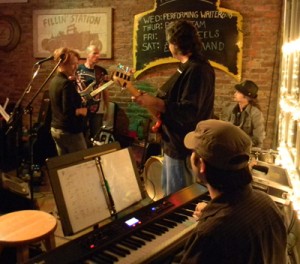 get me wrong, the vocal performances were pretty strong to begin with). Alums, Elton Charles on drums and Rick Carizales on guitar, also sat in and did a fine job backing up some of the guests. Brian Lucas made a big contribution by charting out many of the songs in advance, and Shantell helped out by taking photos and some great video excerpts (see below).
get me wrong, the vocal performances were pretty strong to begin with). Alums, Elton Charles on drums and Rick Carizales on guitar, also sat in and did a fine job backing up some of the guests. Brian Lucas made a big contribution by charting out many of the songs in advance, and Shantell helped out by taking photos and some great video excerpts (see below).
It really was a special evening, fun was had by all and I think everybody learned a few things too. I want to thank Judy Rodman, our house band (Heston Alley on drums, Tom Good on bass, Brian Lucas on keys) and all the alums who participated and helped make this a special evening, I can’t wait for the next one!
The next Nashville Berklee Jam will be held on Tuesday, April 10th at the Fillin’ Station with special guest, Reese Wynans, formerly of Stevie Ray Vaughn & Double Trouble. His talk will share perspective on being a lifelong career musician, working with SRV, and the importance of understanding blues and roots music. Please check our website regularly for updates.

 Dallas Davidson Talk – 35 min
Dallas Davidson Talk – 35 min The One That Got Away
The One That Got Away Gimme That Girl
Gimme That Girl I Don’t Want This Night To End
I Don’t Want This Night To End Country Girl Shake It For Me
Country Girl Shake It For Me